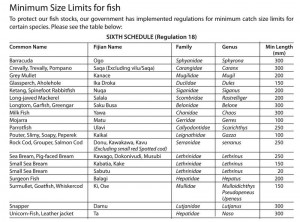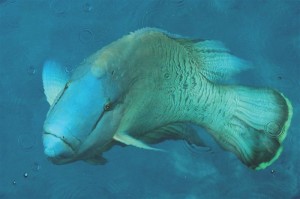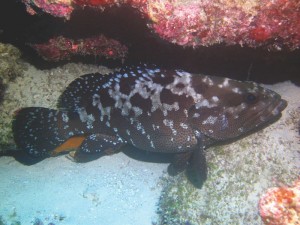There are strict laws prohibiting the use of underwater breathing apparatus to collect, take or dive for fish throughout Fiji. If you plan on using fishing nets, there are mesh size restrictions you should, enquire with the Fisheries Department for these regulations.
Minimum Size Limits for fish
To protect our fish stocks, our government has implemented regulations for minimum catch size limits for certain species. Please see the table below:
Absolute No No’s
The following information has been taken from the Fisheries Act Cap 58.
No person shall take, be in possession of, sell, offer or expose for sale or export any of the following:
Trochus Shell Trochus niloticus (sici) measuring less than 90 mm [3.5 inches] across the whorl;
Tritons Trumpet Shell Charonia tritonis (davui) The Triton Trumpet is now a rare find in the Pacific, most often found at moderate depths of 5—20 meters and deeper in coral rich habitats. It is an active predator on coral eating sea stars like the Crown of Thorns Starfish and cushion stars.
Pearl Oyster Shell Pinctada margaratifera (civa) Pearl Oyster Shell (civa)of which the nacre or mother-of-pearl measures less than 100 mm [4 inches] from the butt or hinge to the opposite edge or lip.
Giant Clams Tridacna derasa / squamosa / maxima (vasua) flesh, including adductor muscle or mantle tissue.
Beche-de-mer (sea cucumbers) Metriatyla scabra (Holothuria scabra) (dairo) (sandfish) No person shall export, either in a natural or processed form, any other species whatsoever of a length less than 7.6 centimetres [3 inches].
Live fish of any kind;
Turtle flesh;
Turtle shell Turtle shell unless worked into jewellery or otherwise processed into a form approved by the Permanent Secretary for Primary Industries and Cooperatives.
Guidelines for Other Species
Turtles
The Fiji Fisheries Act prohibits the killing of sea turtles. Fiji has a national moratorium in place until January 1st 2019 that prohibits harassing, taking or killing of turtles or their eggs. Furthermore, anyone caught selling turtles can be fined FJ$20,000 or face a prison sentence of five years!
Humphead Wrasse
The humphead wrasse, Cheilinus undulatus (also known as the Maori wrasse, Napoleon fish or varivoce in Fijian), is a large and quite spectacular reef fish that can grow to over 140 cms! Divers and snorkelers alike are usually thrilled to encounter one of these fish on the reef, and sighting one is a sign of a healthy reef ecosystem as they are one of the few creatures that predate the crown-of-thorns starfish that can decimate coral reefs. They are also very easily overfished and so if present, may suggest that fishing pressure is not very high.
Unfortunately, the humphead wrasse is considered a delicacy in East Asian countries and has been heavily targeted by the live reef food fish trade in many tropical countries. A humpie won’t reach maturity (i.e. it wont breed) until it is about 50cms/6- 7 years old. This has put the species in quite a serious situation because most fish for the Asian live fish trade are taken while still juveniles, and therefore before they can reproduce.
Listed as Endangered on the IUCN Red List, and included in Appendix II of CITES, here in Fiji bans are only in place for commercial harvest, sale or export. We hope that you will help us give this species a break, and choose not to take one from our reefs.
Groupers/Rock Cod/Coral Trout
Each year, groupers aggregate at specific sites to spawn or reproduce, usually at full moon. Traditionally these sites were well known to our subsistence fishing forefathers, who would capitalize on the opportunity to catch many fish from one spot, without exerting much effort. But in modern times and as fishing pressure has increased, particularly for commercial sale, the gathering of groupers to spawn in the same spot, at the same time of year, has made it far too easy to overfish them. Studies have shown grouper numbers have steadily declined in Fiji. But you can help turn that around with a simple pledge not to eat, sell or buy grouper during the spawning season. If you do happen to land one, consider this information and gently release it back into the ocean so that they can release literally millions of eggs to help repopulate our reefs.
To report any aggregations you come across, please contact the SeaWeb Asia Pacific on (+679) 331 2250, email [email protected] or log on join the 4FJ movement.



Leave a Reply